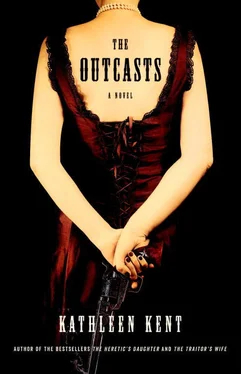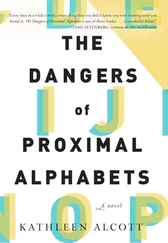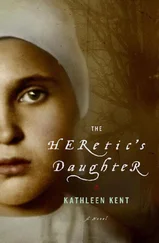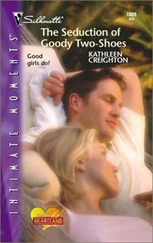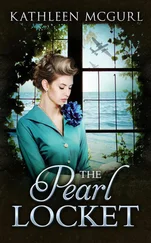Next to the portrait, Lucinda often placed objects, which she changed frequently, like offerings: a small colored stone, a tiny flower, a bit of shiny moss. It had become a shrine where the girl’s displayed beauty could serve as a constant reminder of Lucinda’s fatal complicity, and she attended the shrine daily in dutiful penance, standing for hours in front of the portrait until her legs throbbed, willing herself to recall May’s every gesture, every smile.
Now she pulled the lavender scarf over her shoulders and knocked at the cell door for the matron to release her to her classes. She had been tutoring some of the women of the prison and found that a few had a true talent for mathematics. The teaching gave her a modest satisfaction and the sense that she was serving her term willingly, gracefully, filling her time productively—making herself worthy—until she could receive word about her child.
The classroom hours shored up the solitary times when clouded recollections of a man’s voice calling her name or of tangled, blood-filled sheets threatened to send her into a black pit of horror and remorse. She could push away the waking nightmares by seeking out the lines, angles, and elliptical spaces that gave proof to her world, proofs that calmed and comforted her, that helped erase the memories.
But most important, when looking into the faces of the younger inmates, some as young as twelve, she could imagine her own daughter looking to her in gratitude, in understanding, in forgiveness. She had time, and in time, all things were possible.
The man perches next to the girl in her bed, the covers tucked around her small frame, telling her, as he often does, stories of his life: of his boyhood spent in want on the heavy, compacted soil of Oklahoma, not fifty miles from where they sit, softly talking in the half-light of her room. He tells her what he learned from his father growing up: how to break a horse to hard service, with rope and a whip. But he reveals how, years later, he learned from his wife, the girl’s mother, how to gentle a horse to usefulness by watching and reading the signs that he gave; to move obliquely, and without menace, into the horse’s line of sight; to stand calmly, staring into the middle distance, giving the horse a chance to order its quicksilver thoughts inside the passages of its narrow skull.
He tells her how he left home for Texas and at sixteen was called to fight a war in Arkansas. The girl speaks for the first time, recalling that he was too young to fight. Yes, the man says, too young to fight, but not too young to bring three hundred horses back to Texas.
All but two, the girl says.
Yes, all but two, the man answers.
He recalls how he met her mother at a mission dance and how she looked in a pale summer dress, her black hair swept back from her face like wings, and the girl smiles and adds, as she always does, And then I came.
Yes, and then you came.
He recounts how he left for Texas to serve as a lawman for half a year, and here the girl attends more closely as the man’s story becomes more expansive, and he describes his fellow lawmen, Texas rangers who fought for twenty years to bring order to chaotic, lawless places.
The girl offers the names of these rangers dutifully, carefully, Captain Deerling and Dr. Tom , as though reciting her own lineage, understanding that, though they were not blood kin, they were of close fellowship to her father; knowing too with a child’s innate sense of fairness that blood alone does not make lasting connections between people, any more than does desire or time or proximity. She repeats their names so they won’t be forgotten.
He nods at her recitation, describes to her their journey together for months across the entire expanse of Texas: the cactus ringed with purple and blue-tinted agave and saw grasses that when taut were sharp as knives. He recounts seeing striated rock, pink and gray, with overlying dirt the color of blood. He was witness to caves worn into cliff faces, looking like open, staring eyes, and indented spaces worn by cliff-side floods, appearing as doors cut into the rock by giants. Trees would lean over the edges of rocks as though listening to their passage, their twisted, hanging roots looking like nothing so much as legs crossed in timeless waiting, and abutments the shape of horse’s heads or pointing fingers piercing the scudding clouds that formed and disappeared and formed again in tumultuous succession.
He tells her of the cities farther east, Austin and Houston and Galveston, and of the legends of pirate’s gold in a place called Middle Bayou.
Here the girl holds out her hand and the man places into it the heavy gold coin, old and worn, warmed by his own fingers.
Middle Bayou, he says, stressing the words as though in admonition; the passing-through place, the place of constant sorrows and unexplained miracles, of contrary laws to man and nature, where the lame can suddenly walk, and armored monsters swim in warm and muddy rivers preying on man and beast alike.
And then, the girl prompts, and then to the city across the Gulf.
To the city, he agrees, where horses fly from boats and swim to far islands like waterbirds; with streets the width of rivers, and men who do battle in those streets like Old Testament warriors. He tells her of the king of thieves holding sway over his court, residing in a bell tower above an ancient church, and of the king’s challenge to him to bring down a terrible rooster, perched on a high aerie over the city, the rooster legion in size with a body of beaten copper and a head of ruby glass so cunningly faceted that at sunset it blinded all the citizens with its light.
He recounts for the girl the preparation needed for the rifle—the heavy powder measure, the six-sided bullet, the copper caps made only in England—given to him by Deerling. The only gun to make the impossible shot…
Nine hundred and eighty yards, the girl whispers.
Nine hundred and eighty yards , the man affirms. He had once marched off the distance carrying her on his shoulders, designating a large tree as the target, and he remembers her disbelief that any bullet, from any gun, could traverse such a distance.
But he makes the impossible shot, he assures her, knocking the head from the rooster, and the king and the citizens rejoice and, as reward, he takes back from captivity a beautiful lady who’d been stolen by pirates from Middle Bayou, a schoolteacher who had, because of the terrible hardship of her journey, become lost in her mind. He had taken her back to Texas, to a high-walled place where she could regain her better self.
And is the lady returned to herself? she asks.
But the girl’s eyes have begun to close and he doesn’t answer the question, sitting with her instead, watching the soft sheen of her cheek, the spread of her hair across the pillow.
He takes back the coin from her uncurling fingers and slips it into his pocket. She had asked him once about the nature of good and bad and if the coin itself was evil, having moved so many people to violence. He told her what Dr. Tom had once told him: that most things had been placed in the world either to assist in a man’s journey to his better self or to tempt him away from it. The danger with gold, and silver, Tom had said, was that they had the ability to do both, with the result that men had always, since the betrayal of the Nazarene, and would always, to the end of time, be the best and the worst of creatures in their presence.
He watches her sleeping and sees the growing angular planes of her face, so different from the moon-shaped roundness of her mother’s. He remembers the day-old infant with the pale skin and the dark furze of hair placed in his wife’s hands by the missionary workers, his wife who could bring life to the most arid plot of land but who could not grow a child in her belly.
Читать дальше
